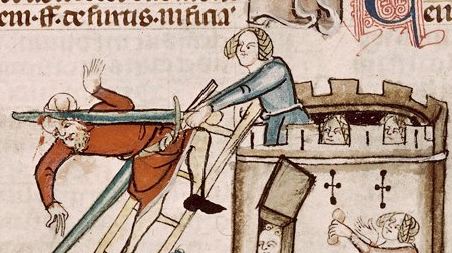
Charlaine Harris:
“Don’t go looking for trouble; it’s already looking for you.”
Don’t open the door. Don’t go outside. Both (usually acts of “tactical” stupidity and foolish bravado) are almost never a MUST; are contraindicated by most of the SHOULD considerations; likely affect the MAY negatively, and; almost certainly make the CAN more difficult and dangerous. So, just don’t. It’s really that simple.
A scenario I find quite often in my daily scan of nationwide use of force incidents is one which involves a resident (“defender”) who goes from inside to outside the castle. To investigate or otherwise respond to a noise or event, or to confront a suspected or actual burglar, vandal, trespasser, or personal property thief. The scenario often concludes with the defender’s use of deadly force. The defender claims resort to deadly force was necessary because of the malefactor’s response when discovered/confronted. The defender may or may not have brandished a firearm as a warning and/or gunpointed the malefactor, before using deadly force. The attendant dynamics and legal principles for this common scenario are often misunderstood and incorrectly analyzed. By drive-by lawyers (real and “keyboard”), “social justice” activists, and of course, journalists.
Don’t conflate the MAY with the SHOULD
You must know your state law on the justified use of force, deadly and non-deadly. It may be significantly different from within and without the castle. You also need to understand how the law distinguishes defense of property from defense of self and others. Of note: Does the castle end at the doorways, or is a porch, garage, or open/fenced yard included? Is there a crime in progress? If so, is it a crime for which defensive force is lawful regardless of any threat of unlawful force or harm to you or others? What level of force is lawful to “protect” property? Must you be inside for any favorable castle law (no duty to attempt retreat for example) or defender favorable presumptions to apply? How is the self-defense predicate necessity applied under your state law? What is the law on one who is deemed to have provoked a situation which ends in the use of force? What level of force is brandishing? Gun-pointing? When are they lawful? When may a malefactor lawfully be pursued? Detained?
One example (from Florida), the subject of media coverage for more than two years, is recounted HERE and HERE. I will stay in the lawyer’s lane in this post and only offer legal analysis (the MAY), which is likely similar in other states: The prosecutor came to the correct conclusion (no prosecution), noting (as related to the specific use of deadly force on the curtilage of the home), that the defender’s going outside “is of no legal consequence.” The prosecutor’s memorandum doesn’t expound on Florida law, and is lacking in citation to case precedent. The rationale however, is likely this: Going outside, however characterized, does not invoke any notion of “Stand Your Ground.” The defender, under imminent attack, had no “duty to retreat” (but did) before using deadly force. The defender lawfully brandished/gunpointed (non-deadly force as a matter of law) in defense of property and/or self. The malefactor had no legal privilege to use any force in response. A disarm of the defender would be robbery (a forcible felony). Given the facts and circumstances at the time, and reflecting on the occurrence a few minutes before, defender believed he was about to suffer imminent great bodily harm. Under Florida law, deadly force is justified if reasonably believed necessary to defend against imminent deadly force or to prevent the imminent commission of a forcible felony. It is also justified, without consideration of reasonable belief, imminence, or necessity, to resist an actual murder attempt, or the commission of any felony upon the person or upon or in a dwelling. The defender was under no legal obligation to issue a warning or challenge, or to first attempt to defend with non-deadly force. The defender is not an “aggressor” under Florida law because he went outside and gunpointed the malefactor. The reasonable belief of the defender in this particular case is bolstered by the earlier criminal behavior of the malefactor, including his intoxicated, dangerous demeanor. There is no basis to conclude the state could carry its burden to disprove justified use of deadly force, either in a pretrial immunity hearing (clear and convincing evidence), or in a criminal trial (proof beyond a reasonable doubt). Thus, the defender may not be detained, arrested, or charged. An unnecessary killing manslaughter statute which by its language could apply, has been ruled inapplicable in self-defense scenarios by controlling case law.
Florida statutes and cases unequivocally support the above analysis. Case closed. It’s really that simple. Except, I note: Defender lost some evidentiary presumptions by going outside – see Fla. Stat. §§ 776.013(2), (4).
Does a WML or aimed laser dot change the legal analysis? No.
The SHOULD? That’s on you. See HERE.
Suggested lawyer reading: Simons, “Self-Defense: Reasonable Beliefs Or Reasonable Self-Control?” Available online HERE.
Disclaimer: No MSW post constitutes legal advice, or creates an attorney-client relationship with a reader.


